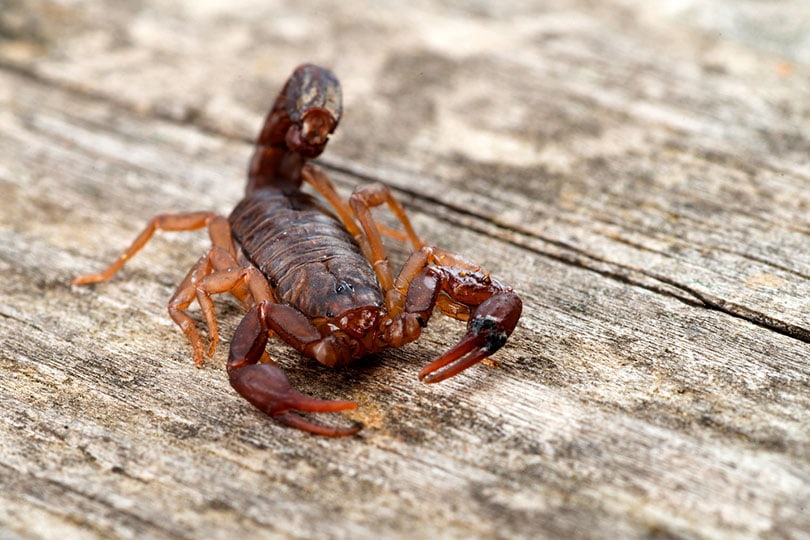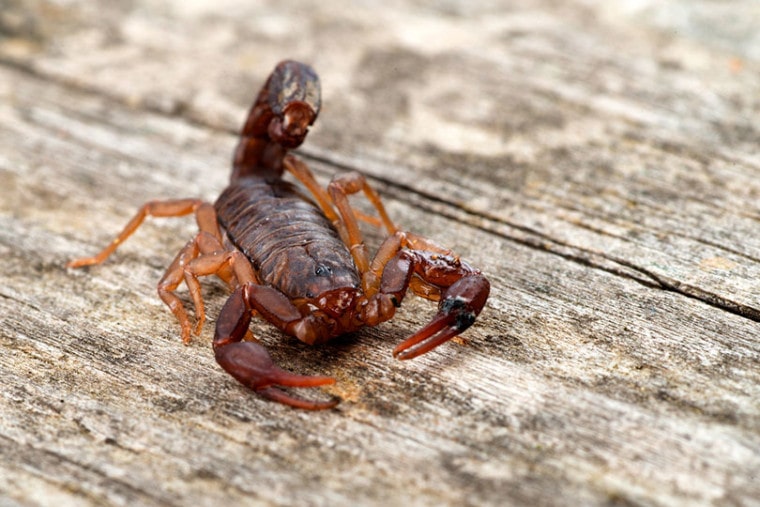- May 21, 2024
My Dog Was Stung by a Scorpion, What Should I Do? Vet Approved Advice



The information is current and up-to-date in accordance with the latest veterinarian research.
While the thought of your dog getting stung by a scorpion is scary, the good news is that scorpion stings are rarely fatal in dogs. Nevertheless, we recommend getting your dog to the vet immediately because of the pain it causes and to reduce the risk of complications. A yelp is likely the first indication your pet has been stung, but other signs include dilated pupils, drooling, and worse case, labored breathing. If you’re concerned about your dog getting stung by a scorpion, keep reading as we go over everything you need to do.

Here’s What to Do
The best thing you can do if your dog is stung by a scorpion is to call your vet before driving to the clinic so that they’re prepared for you and your pup. Once they know you’re on your way, put your dog in your car and drive them to the vet.
The sting can be quite painful, and there are a couple of things you’ll need to keep in mind:
- Be mindful that your dog may not want to be touched at the wound site.
- Try to keep your pooch from licking the area.
- Apply ice or an ice pack wrapped in a towel to reduce swelling and pain.

Risks Associated With Scorpion Stings
A variety of clinical signs can be seen in dogs stung by scorpions. The sting can cause pain, and inflammation, which can cause redness, swelling, and itchiness at the site. That’s potentially why your dog is so anxious to lick the wound.
Possible signs of scorpion stings in dogs:
- Yelping
- Jumping back
- Limping
- Licking or pawing at the site
- Tremors
- Restlessness
While there are about 100 species in the United States, the main one of medical significance is the Arizona Bark Scorpion (Centruroides sculpturatus). It lives in the American Southwest and is of particular concern in the state that gives it its name. The venom can cause excess stimulation of the nervous system, leading to changes in heart rate, blood pressure, twitching and drooling.

Treatment of Scorpion Stings
Treatment for scorpion stings is primarily supportive. Your vet may sedate your dog if your pet is agitated, and deal with the sting site, as necessary. Follow-up includes pain medications to keep your pup comfortable. Your vet will also treat other signs, such as administering fluids if your dog has been vomiting or experiencing GI distress.
Close monitoring of your dog is necessary since the effects can persist. While an antivenom exists, it may not be readily available; further, it is most effective only when administered right after the sting; it may not be efficacious after the fact.

Preventing Scorpion Stings
Of course, you must always be on guard if you live where scorpions dwell, especially at night when they’re active. Anything that was outdoors needs to be checked before bringing it inside your home. That includes wood for a fire pit, as woodpiles provide ideal hiding places for these pests.
It’s tougher if you’re not used to this kind of vigilance as a visitor to the American Southwest. You can follow many of the precautions for preventing ticks from getting in your house. Another clever trick is to inspect your home using a UV light. The shells of scorpions glow in the dark when you shine a black light on them. It’s a quick way to ensure things are safe without any nasty surprises lurking.
We recommend supervising your dog when outside in the yard. Often, pets will sniff around, exploring their world without regard to the threats that may exist. If your pup is a digger, we suggest discouraging this unwanted behavior, as you may never know what your pooch may unearth.

Final Thoughts
Treating a scorpion sting promptly is imperative. These wounds are painful and dangerous if your dog has a strong reaction. Care is mainly supportive, with managing pain being a top priority. Some issues may persist, warranting close monitoring of your pet as they recover. Fortunately, these encounters are rarely fatal. Nevertheless, prevention is necessary if you live in a place that scorpions call home.
Featured Image Credit: Rob Hainer, Shutterstock
Tags
What do you think?
Related Articles

New Puppy Checklist: Gear You’ll Need for Your New Dog
Getting a new puppy is really exciting, but before you welcome them home, it’s important to prepare your space for them. Since puppies need a

How Big Do Mini Poodles Get? Vet Reviewed Average Weight & Growth Chart – Dogster
The information is current and up-to-date in accordance with the latest veterinarian research. Learn more » When you buy a Miniature Poodle, you might not

Can Police Dogs Smell Nicotine? Vet Verified Facts & Info – Dogster
The information is current and up-to-date in accordance with the latest veterinarian research. Learn more » While cigarette sales have been declining steadily for decades,

How Old Is 5 in Dog Years? Vet-Approved Guide to Each Size of Dog – Dogster
The information is current and up-to-date in accordance with the latest veterinarian research. Learn more » A common method for calculating a dog’s age is

